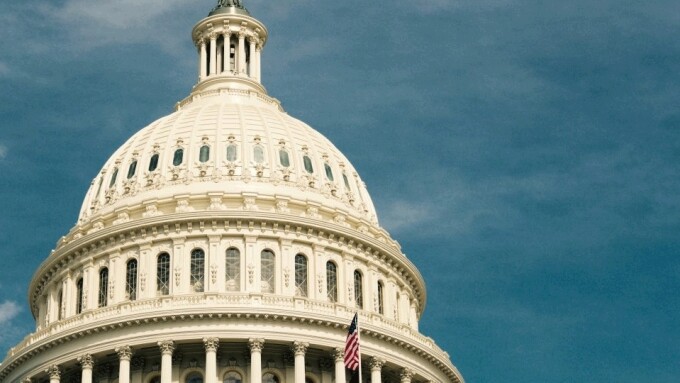WASHINGTON — The U.S. House of Representatives today passed H.R. 1865, a piece of legislation known as FOSTA, which would make it easier to penalize operators of sites that facilitate online sex trafficking.
The bill now goes to the Senate where it has good prospects of becoming law. The Senate already has passed a similar version out of committee.
The House, 388-25, overwhelmingly approved the bill, officially titled the Allow States and Victims to Fight Online Sex Trafficking Act, which has unleashed an unprecedented push toward internet censorship and likely will do nothing to fight sex traffickers.
H.R. 1865 allows for private lawsuits and criminal prosecutions against internet platforms and websites and likely will lead to websites policing user speech.
Tonight, the Free Speech Coalition's executive director, Eric Paul Leue, told XBIZ that today's vote, "sadly, is not an unexpected outcome."
"Despite our efforts and outreach, Congress does not seem to know, or care to know, the important role that online platforms and adult business have historically played in the disruption of sex trafficking," Leue said.
"In addition to removing a critical tool in the identification of traffickers, those behind the bill have now dismantled one of the most important pillars of the free internet, the Communications Decency Act. Rather than prevent online sex trafficking, we expect FOSTA to be used to push legitimate sex workers underground and censor actual victims.
"Over the past two years, we've been warning our members that the we are facing the free speech battle of the 21st century," Leue said. "Not just FOSTA and SESTA, but the restriction of independent voices through the repeal of net neutrality, and spurious legislation like the Human Trafficking Prevention Act. While this defeat stings, it will only make us redouble our efforts.
"The adult industry has and will continue to fight for the rights of sex workers. If politicians would like to truly fight trafficking — not silence sex workers, or push sex work underground — they would be well served to work with us. We now focus our efforts on the Senate, where we hope we can stop FOSTA and prevent politicians from further crippling the fight against trafficking."
Separately, the Electronic Frontier Foundation said that FOSTA would punch a major hole in Section 230, enabling lawsuits and prosecutions against online platforms — “including ones that aren’t even aware that sex trafficking is taking place.”
“The Internet we know today is possible only because of Section 230 of the Communications Decency Act, which prevents online platforms from being held liable for their users’ speech, except in certain circumstances. If websites can be sued or prosecuted because of user actions, it creates extreme incentives,” the EFF said tonight.
“Some online services might react by prescreening or filtering user posts. Others might get sued out of existence. New companies, fearing FOSTA liabilities, may not start up in the first place.”
Section 230 simply isn’t broken, the EFF said. “Right now, there is nothing preventing federal prosecution of an internet company that knowingly aids in sex trafficking. That includes anyone hosting advertisements for sex trafficking, which is explicitly a federal crime under 18 U.S.C. § 1591, as amended by the 2015 SAVE Act,” said the nonprofit organization that defends digital civil liberties.
FOSTA and other similar legislation arose as Congress learned that its current anti-trafficking laws could not be applied to websites like Backpage.com.
Backpage has successfully cited Section 230, which protects websites from liability for material posted by third parties, to evade both criminal prosecution and civil lawsuits.
Industry attorney Lawrence Walters of Walters Law Group told XBIZ tonight "this stampede towards internet censorship is misguided and ultimately harmful to the vulnerable demographic that lawmakers claim to protect."
"Google and the EFF are right to oppose this effort and stand with the cause of online freedom," Walters said. "The battle now turns to the Senate, which represents the last arbiter of reasoned legislative debate on this important issue."
Another industry attorney, Joe Obenberger of J.D. Obenberger and Associates, said that, if signed into law, FOSTA’s effects will be “nuts.”
“I deal with law enforcement subpoenas served on my clients who run advertising sites regularly,” Obenberger told XBIZ. “I can't help but think that drying up these sites will hurt law enforcement track down victims and perpetrators. In fact, it will impede those things and hurt people.
Obenberger also said the piece of legislation is not well targeted at trafficking or oppression.
“It strikes against truly independent, self-sufficient workers who charge huge sums and keep all the money for them,” Obenberger said. “There is a hidden agenda here about imposing a moral schema and making a false claim that it serves to protect the victims of crime.
“This whole agenda serves to promote crimes that will never be discovered and to protect criminals who will keep on going,” Obenberger said. “This includes the blackmailing of customers and thefts and assaults against them, as well as the sometimes-victimized providers. It is wrong on every level to stigmatize this and to keep it in the shadows.”






